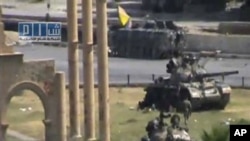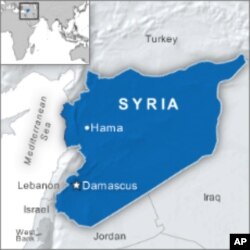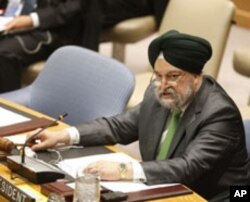Syrian President Bashar al Assad says he will allow a multi-party political system, one day after the United Nations Security Council condemned his government's crackdown on popular protests. But human rights groups says at least four more people have been killed as troops try to put down the uprising.
Syrian state media say President Assad issued a decree Thursday authorizing political parties other than the Ba'ath - the Assad-family dominated party that has ruled the country with an iron fist for decades.
But the announcement of an alternative to single-party rule, light on details and coming one day after international criticism of the government, might have carried more weight if previous promises of reform had been carried out.
Nadim Shehadeh is a political analyst at the London-based Chatham House.
"All these are tricks of the trade designed to confuse the international community," said Shehadeh. "Nobody in Syria believes that this is feasible. It is very clear that the regime has no intention to reform in any serious way. The way the regime thinks is that it can still suppress the revolt in the traditional manner that it has done before."
Ongoing suppression
Human rights groups and witness reports Thursday say suppression is continuing. Particularly hard hit is the city of Hama, where more than 100 people are believed to have died in a government offensive that began Sunday. A spokesman for the Arab Commission for Human Rights, Haytham Manna, says the situation is very bad.
"We have a lot of people killed and injured and we do not know exactly what happened in two quarters in the city because it is completely isolated from the world," he said. "There is a good part isolated, completely isolated, by all ways of communication now."
With phone lines in several areas cut, and heavy restrictions placed on the few journalists allowed to work in Syria, much of the information is coming out through witness accounts and amateur reports.
Much of the information cannot be independently verified, but there is a consistency to the reports coming from across the country. Human rights groups estimate 1,700 people have been killed in the five months of protests. The government blames the unrest on armed gangs and foreign intervention.
UN statement falls short
Given the ongoing crackdown, human rights monitor Manna says the United Nations has fallen short. "Unfortunately, it is not enough. With a statement, the international community can say that we did our best, but for the people, it is another thing," he said.
French Foreign Minister Alain Juppe defended the U.N. move Thursday, saying it was an important step and pointing out it was the first time the Security Council had "unambiguously" condemned the violence and explicitly warned the Syrian government about its actions.
Political analyst Shehadeh, speaking from Beirut, agrees that as weak as he finds the statement, he thinks it signifies that an international consensus is, at last, beginning to emerge.
"In a way, what is happening in Syria is simple," he said. "It's Washington that seems much more complicated. It's the U.N. Security Council that is much more complicated. Brussels is much more complicated. And it has taken a very long time for a very-watered down statement like this to come out."
Shehadeh argues that part of the problem is that the international community is telling the Syrian government to reform, when, he says, it has shown it is "unreformable."






